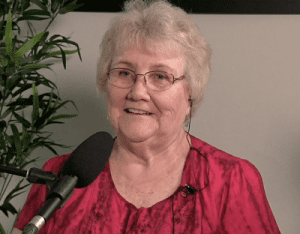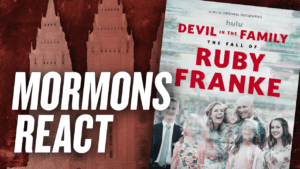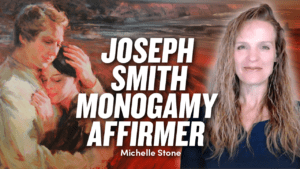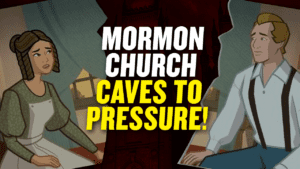 In response to a recent article published in the Deseret News titled “Defending the Faith: The supposed scandal of multiple First Vision accounts” by past Mormon Stories guest Dan Peterson, we assemble an all-star panel to conduct a deep dive into: 1) The multiple and conflicting accounts of Joseph Smith’s first vision, and 2) How the Mormon church and apologists mislead church members about the issue. Our panelists include Sandra Tanner, Mark Crego, Warren Ludlow, and Johnny Stephenson.
In response to a recent article published in the Deseret News titled “Defending the Faith: The supposed scandal of multiple First Vision accounts” by past Mormon Stories guest Dan Peterson, we assemble an all-star panel to conduct a deep dive into: 1) The multiple and conflicting accounts of Joseph Smith’s first vision, and 2) How the Mormon church and apologists mislead church members about the issue. Our panelists include Sandra Tanner, Mark Crego, Warren Ludlow, and Johnny Stephenson.
Learning that his article has caused a commotion of both scorn and support, Dan Peterson wrote the following response.
Part 1:
Part 2:
Part 3:
Part 1
Part 2
Part 3




21 Responses
If it’s not an issue and the church is so open with this information to all members why can’t we speak of these things in church?
We talk about these things extensively in my ward amongst Bishopric, High Councilors, and Stake Presidency. It was published in the Ensign in 1970.
If these things are talked about extensively in your ward amongst Bishopric, High Councilors, and Stake Presidency, I’m sure it is through side conversations rather than correlated meetings. I am personally aware of Bishops and Bishopric Councilors that have only recently heard about the Gospel Topic Essays. And once they hear about the Essays they only skim a few as a general overview. Until the information in the Essays is published in correlated lesson manuals, the church is still banking on people being gas lighted when family/friends/Ward Members tell them that the information has been well published and documented on LDS.org. A Bishopric councilor recently praised me for the knowledge about church history that I have gained over the last 6-8 years through the studying I have been engaged in. He then said, “I don’t want to know what you know.” I think that is very telling.
A good thing about Daniel Peterson’s article is that it causes people to talk, and the podcast machines to churn out great discussions like this one. Thank you Daniel Peterson by helping more people to understand that a rabbit hole exists. We desire all to see how far down it goes.
Because the things we talk about in church are to build faith and learn how to become more like the savior. Church isn’t an open forum. Great questions in a religion class in college, or Institute or Seminary, but church is not the place for it.
Great job
Sandra’s suggestion that the Church should change to the 1832 version was hinted at in 1966 by Jim Allen, supported in 1969 by Dean Jessee, presented to the non-Mormon community in 1976 by Arrington and Bitton,definitely promoted in 1982 by Marvin Hill and throughly documented in 2014 by Stan Larson as the best way to go forward
I wonder if it would just be better to move to the Community of Christ in that case? Maybe not…that would be a major and much harder shift for members.
Interestingly enough in 1974 my wife and I visited the Kirtland temple and listened to the RLDS tour guide talk about Joseph Smith’s “experience with God” after he prayed in the sacred grove. We thought that was a very vague way to describe the first vision. Now in hindsight, I can see that the RLDS historical department under the leadership of Richard Howard, Robert Flanders, Paul Edwards, Bill Russell etc were coming to grips with “New Mormon History”. Leonard Arrington during the “Camelot decade” always reached out to the RLDS community and appreciated their “experiences with God”. John Dehlin’s interview with the Community of Christ President Stephen Veazey showed that that is still a good approach. Mark Crego’s reference to William James’ book The Varieties of Religious Experience is right on point. One of James’ students at Harvard, Levi Edgar Young, when he became a general authority started the ball rolling on First Vision research when he asked for the sources referred to by BH Roberts in his published historical works. Joseph Fielding Smith told Young he would need First Pres authorization. Young got it from Heber J Grant, J. Rueben Clark or David O. Mc Kay. He read the 1832 account but could not use it in public. Lamar Peterson came to Levi Edgar Young with questions of historical difficulty and Young referred to the strange account of the first vision. Peterson waited until Pres Young died ( I believed at his request) to share this with the Tanners…….now we have access to many of the religious experiences of the early LDS leaders. We thank the Tanners and the Larry H Miller family for making this happen. Johnny Stephson’s reference to the Howard Corey draft of “The History of Joseph Smith” was a treat. I had read it when it was published in 2012 but had forgotten about it. Thanks again to everyone for this fair and even handed approach to Joseph Smith’s revelations.
First Vision Reflections
Thank you for this podcast! If this was covered in one of the 3 episodes and I missed it, please forgive me. I would like someone out there to please help me with my thoughts on all the “to do” about the multiple first “VISION” accounts. Please, correct me if my thinking is flawed in some way, my feelings won’t be hurt. The question I always ask myself is that if this event really happened to Joseph in the physical realm in a physical grove where he actually wrestled with some real being that was from the “unseen world” and if this encounter with an actual being or beings that descended in a pillar of light actually spoke to Joseph like Christ spoke to a multitude of people in the ancient Americas and put children on his knee and blessed them and actually had the multitude come and feel the prints of the nails in His hands and in His feet, why on earth do we keep calling Joseph’s experience in the grove the First Vision? Why isn’t Joseph’s experience in the grove called the First Visit? We refer to the encounter that the ancient inhabitants of America had with Jesus as the “Visit of Christ to the Americas”. If it happened in the mind’s of the people we would probably call it the “Vision of Christ to the Americas”. Perhaps the Church is just trying to be very honest by continuing to call the experience in the sacred grove a vision, something that happened in Joseph’s mind, and not an actual visit that was filtered through one or more of Joseph’s five physical senses. If it was an actual visit that was filtered through Joseph’s five senses, I’m thinking it would have been nice if Jesus would have allowed Joseph the same tactile experience that he gave a multitude of men, women, and children 2000 years before, especially since he was the future translator of that ancient account. If it was a “vision”, one that was perceived without out the earthly five senses, I’m willing to give Joseph a bit of leeway. I think multiple versions of a “vision” perceived in the mind carries a different weight than multiple versions of a visit perceived through the five senses. So, as long as the Church continues calling the encounter in the grove the First Vision, I’m going to take the Church at its word, that it was a vision or communication to Joseph’s mind through another sense and not a visit that Joseph perceived with the five physical senses. Please, someone out there, if my thinking is off, give me some help by referring me to an article or something to rearrange my neurons. Maybe I’m the only one in the Church that based my testimony on the foundation that Joseph actually saw and heard Beings with his physical eyes and ears. All I ask is no gas-lighting please, give me something to work with and really meditate about. I’m doing enough mental gymnastics with other things on my shelf like: Why is it that the living prophets after Joseph Smith are not having similar visions or visits? Why in these latter days does the burden have to rest on just one man’s “vision”? Please forgive me, that’s a whole other issue. For now, I’d like to deal with First Visions First!
Garth,
https://www.josephsmithpapers.org/site/accounts-of-the-first-vision
Garth,
I appreciate your question – it is a good one. Joseph (not the modern day LDS church) called his experience a “vision.” It really doesn’t make a difference if we debate the semantics of what it is called now, as he was the one to name his experience this.
We can try to dissect it to determine if it really was what we now consider “a vision,” or in other words to determine if the experience was something that he perceived with his five physical senses. For example, in Joseph’s words he relates that he heard a noise like someone walking behind him (auditory) He says he saw two personages (visual) who spoke to him (auditory.) He asked them which church he should join and they answered. So, he conversed with them. Seeing, hearing, and conversing with beings does not constitute a vision in my book, so I can understand the confusion around this.
You say, “maybe I’m the only one in the Church that based my testimony on the foundation that Joseph actually saw and heard Beings with his physical eyes and ears….” Nope, I would say that you are not alone in this interpretation. The way Joseph described his “vision” and the way it has continued to be born witness too, i.e. “I know that Joseph Smith saw God the Father and Jesus Christ,” gives weight to the fact that it was a real physical event and not simply a “vision.”
Since Joseph seemed to have described the event as a physical event, but actually called it a “vision,” I’m not sure we can really get anywhere now, in 2018, by trying to determine what Joseph meant by the word vision. So, when you say that you are “taking the church at it’s word, that it was a vision or communication to Joseph’s mind through another sense and not a visit that Joseph perceived with the five physical senses,” I’m not sure I agree. I think “the church,” like Joseph, call the experience a vision because that is what Joseph named it, but it is still discussed (and born witness to) as if it were an actual event that he experienced through the sense (visual and auditory.)
Great discussion, great panelists, great format. Do this for every “Gospel Topics Essay”, please.
One question I have was whether Daniel Peterson was invited to be on the panel? If so, how did he respond?
Also, just a general comment to Dan Peterson: Thank you for doing something the Brethren have not done: publicizing to the general membership the fact that there are SO MANY DIFFERING VERSIONS of the First Vision. Be careful, though, you might get exed for leading people astray! 😂
Responding to some guy named Dan Peterson?
What next? Responding to cheesy infomercials and direct response TV ads?
A certain segment of the population will continue to buy the thighmasters, shamwows, ginsu knives and clappers, as well as Dan Peterson’s boorish homilies.
Thank you Jon, Sandra and all the panellists, l loved Sandra’s honesty, integrity, sincerity and desire for truth, l would love to hear back from Sandra and keep in touch. l really appreciate all of your important work Sandra for all of us ex mormons and Mormons alike who are searching out for truth and honesty of the churches truth claims. l too feel that the lds church does do more harm than good, partly because it the leaders are just so scared to face the truth of all that should be taught from what joseph really heard and saw and they just don’t want to loose members or money, the truth will always set you free if you are willing to hear it, plural marriage has always been such a damaging practice joseph unnecessarily brought in his religion and l for one feel that it is one of the most harmful things joseph could have put forward to his church members. Thank you for always being so willing to stand up for truthfulness and honesty within the church, l hope more and more people will listen to you Sandra, you are a good person and l admire you and Gerald.
One doesn’t go looking for something one doesn’t even know to look for. I was taught that the foundation of the church was the first vision. I believed and trusted that I was being taught the truth so again why would I go looking for something else. And I know I am not alone. Church members are taught to believe and trust, so to say it was there all along, it had even been published, to me is a stab in the back! Reading the essays in 2013 ended it all for my husband and I and our children. When I read the first vision essay the first thing I said was oh my gosh it’s all a lie and for me it was that simple. And then of course I studied church history because I knew to!
The differing accounts of the first vision is only one problem of many in Mormonism. There is also the lack of DNA and archeological evidence. There are the anochronisms of horses, steel and plants. Then there are the kinderhook plates, an admitted fraud by the perpetrators, that fooled JS. Oh yeah and the total mistranslation of the papyrus JS said was the Book of Abraham. The list could go on further but I will stop here. For these issues apologetic arguments are heavy on supposition and short on logic. So for me it all comes down to not truthfulness but goodness. And Mormonism woefully falls short in that too.
This was an interesting discussion. At one point John comments to Sandra re how she remained a Christian while a large number of ex Mormons become atheists. This subject could be an interesting topic for a podcast (aspects of it have been touched on in other podcasts). When raised as Mormon the existence of a God is an unchallenged given, so there was a lack of deep thinking and reasoning on why one should have a belief in a God (at least that was my experience). Christian physicists such as the English writer John Polkinghorne have published interesting books on the ‘anthropic principle’., ie evidence pointing to a God. Chris Hitchens even acknowledged that the anthropic principle needs to be taken seriously. It would be interesting to have someone like Polkinghorne on the panel (although he’s very elderly now).
These were very interesting episodes. Whenever you have a panel it can get chaotic with people talking over each other. If that happens too much I usually quit listening. But you, John, did well by calling on the panelists to comment individually. As for the topic, the panel brought out a lot of very good points and presented the evidence in a convincing manner. Thanks, all!
Really great podcast very interesting would love to actually go into it a little more in depth loved loved love Sandra Tanner you had some very educated people giving some insightful information thank you
scriptural – in the patterns of all others in the bible- you see Christ first, then he introduces you to the father later- but thats a higher step on jacobs ladder. If God and Christ came to Joseph than they would be breaking that pattern and by so doing breaking their own laws which if God is real, he does not do. So the original version in Josephs handwriting makes the most sense if there is validity to it at all.
Also the fact that he was asking for forgiveness follows patterns of other prophets as well – he was not just asking a question.
This is so damaging because the church teaches that God is no respecter of persons- so we should be able to in theory have the same experience Joseph did- but then the fact that he was not just asking a question but he was at the end of a long soul-searching journey and was asking for forgiveness and then saw Christ (similar to biblical / bom prophets) so when lay members pray with the “if any of you lack wisdom let him ask of God who giveth to all man Liberally and upbraideth not” and then got a visitation when asking “which should I join” – well this doesn’t happen- and it leads all who attempt to receive a similar experience to certain failure. God doesn’t work like this. Then members are left scratching their head and saying why? what do I lack? am I not good enough? Do I not have enough faith? etc.
I guess they changed it because it was just “a better story” but they are doing more damage than good…
I’ve never thought it made sense that only Joseph was allowed to speak to God and get answers. To me, the First Vision account was an invitation to seek our own answers. If Joseph could question the status quo, and talk directly to God, and get answers that didn’t jive with current accepted theology, why is it so horrifying if the rest of us do the same? The lesson of the First Vision, to me, seemed to be that we could.
If we accept the official narratives about them (and the Church does), then Jesus was a religious maverick, Joseph was a religious maverick,…why does the church seek to silence religious mavericks within it’s ranks?